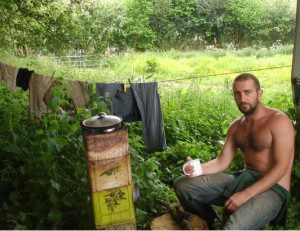

| Visitors Now: | |
| Total Visits: | |
| Total Stories: |

| Story Views | |
| Now: | |
| Last Hour: | |
| Last 24 Hours: | |
| Total: | |
Interview with Mark Boyle, the ‘Moneyless Man’
By Mira Luna
Guest Writer for Wake Up World
Mark Boyle is the author of The Moneyless Man and The Moneyless Manifesto, and is the founder of Freeconomy. After studying economics and business in college, he managed two organic food companies in Bristol, UK. In 2007, a pivotal conversation with a friend sparked the realization that “money… creates a kind of disconnection between us and our actions” and he set up the Freeconomy Community. A few months later, Boyle inspired by the non-violent salt march Gandhi led across India and America’s Peace Pilgrim, he decided to live a more self-sufficient life without money, which he’s done for the last five years.
Mark insists that a moneyless life is not a new idea – it’s the system of money itself that’s a new development, existing for only a small fraction of human history.
I decided to interview Mark, not only because I believe money has had such a detrimental effect on the DNA of modern culture. But also, his story is remarkably inspiring in that, in a short period of time, he achieved great clarity of purpose and acted on it with such urgency and integrity. He embodies a courageous spirit that the world desperately needs right now.
Q: How did you come to the decision to embark on the moneyless journey and how did your background as a trained economist influence you?
A: “There is an entire spectrum of ecological, social and personal reasons why I now believe that it’s imperative that we, collectively and individually, wean ourselves off our dependency on money to meet our needs. However, it began as many journeys do with an initial impulse. It was 2007 and I had been feeling overwhelmed by the horrors I was witnessing around me – factory farming, homogenisation of cultures, bottom-trawling, sweatshops, deforestation, the mechanisation of our livelihoods and the general flat-packing of the Earth along the assembly line of industrial civilisation. I wanted to spend my life doing something I personally felt was meaningful, something to act as a counter-friction to the cogs of the machine economy. But as globalisation disempowers us through its sheer scale, I, like most of us, had absolutely no idea what to do about any of it.
After years of exploring these issues as deeply as I could, I came to the understanding that, in general terms, they had a common denominator – they were all different symptoms of our perceived separation, or independence, from the rest of the community of life: Nature. Money, through its function as a medium of exchange, allows us to consume products with components or ingredients from across the entire Earth. On a superficial level, and with a very narrow sense of self, this has many perceived benefits. What wasn’t being spoke about at the time, however, were the intended and unintended consequences of money, and like all technologies, it has its consequences, regardless of whether we want to be honest about them or not. Apart from its widely ignored psychological, emotional, spiritual and physical effects on us personally, it also had the added consequence of allowing us to be protected from the abuses and massacres that occurred at every level of the supply chain of the products we consumed, and all the social and ecological problems associated with that.
So I began speaking out about these consequences. Yet after a while I felt that I had little right to, being enmeshed in the monetary economy as much as the next person. At that point I had no idea if it was even possible to move beyond monetary economics, or how it would feel as a human being to live without it mediating the majority of my relationships with the rest of life. So in 2008 I decided to give up money, initially as a one year experiment, to see how it felt, if it was possible, and what the lessons would be. It became the greatest experience of my life.
Of course, the reasons why I believe we would be wise to transition away from our dependency on money has evolved a lot over the subsequent years. The first half of my new book, the Moneyless Manifesto, explores these reasons and the philosophy behind moneyless living in depth, before describing a large tool-kit of ways in which we can easily diversify our economies and build much more resilience and connection into how we meet our needs.
My education in economics has, rather oddly, been of great benefit to me, despite the fact that I obviously didn’t go into studying it with this in mind. In order to create a new way of doing things, it helps to fully understand – as much as one can given the complexities of monetary economics today – how the current system works, and the cultural, anthropological and philosophical assumptions underpinning it. It also helped me understand, later in life, that economics should not be conflated with finance, and that monetary economics is but one, and a very recent one at that, model of economy.”
Q: How has your life changed for the better or worse? What do you enjoy most about the lifestyle and what is most challenging and how have you overcome those challenges?



